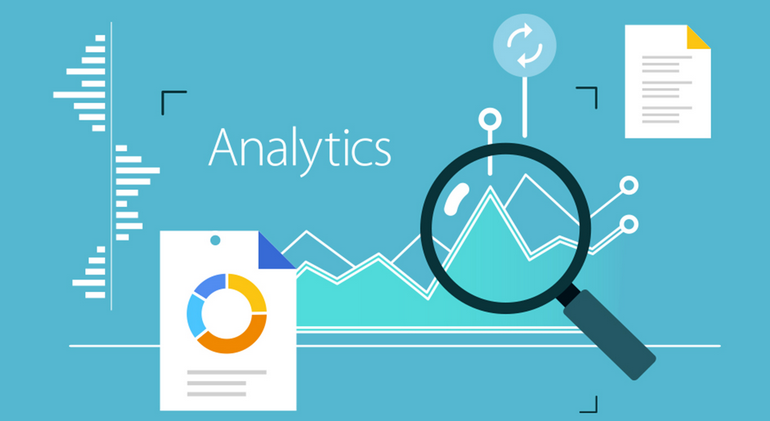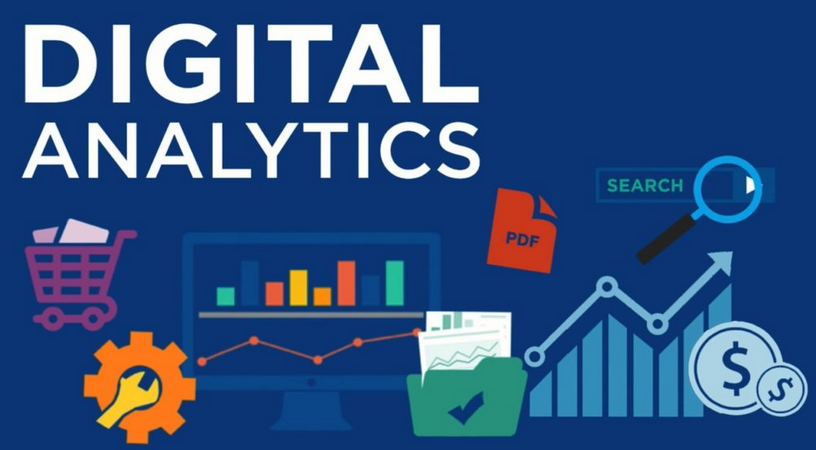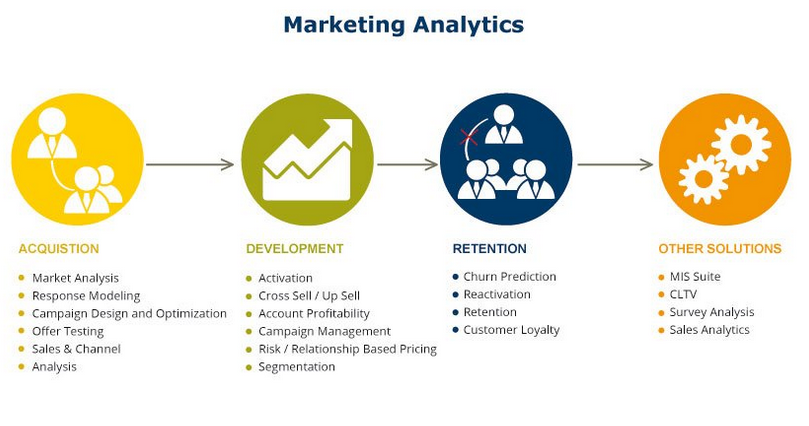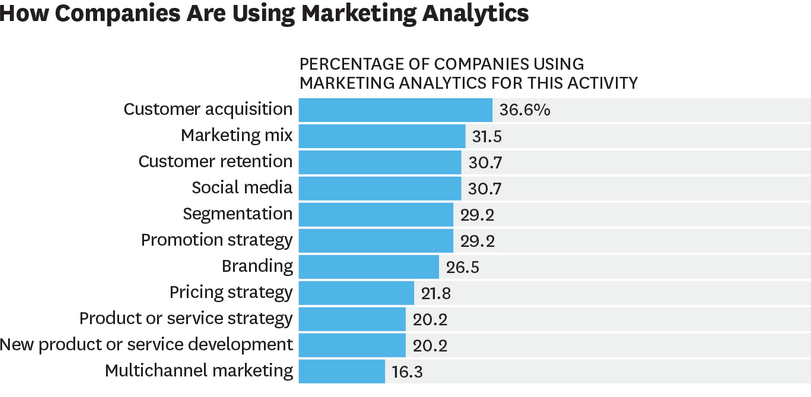us.edmodo.co.id – Digital Marketing AnalyticsIn this modern, sophisticated era, many big businesses are familiar with digital analytics. Today’s business people understand how important it is to have measurement tools for their companies.
Large companies generally have a development team that sets up the process of collecting data from their websites. Even so, if your business is still in the small to medium stage, applying digital analytics to your business can be a smart breakthrough.
If your business is equipped with a website, it is very important to have the tools to do digital analytics. You can do digital analytics by utilizing tools such as Google Analytics which will help collect and convert website data into useful reports. Before talking further, first understand what digital analytics is.
What is Marketing Analytics?

Marketing analytics is the analysis of marketing data, or the study of data through marketing advertising campaigns. When you analyze marketing data, you will be able to understand how various factors interact. Like how campaigns lead to conversions, customer behavior, regional differences, and more.
Now marketing analysis is also widely applied in the field of Digital Marketing because of the strong development of technology and the company’s transformation from traditional models to digital transformation. Today, business data is increasing in abundance, and it requires us to know how to make better use of these data sources.
Why Digital Analytics?

In carrying out marketing activities, in conventional forms such as advertisements in newspapers, TV, radio, magazines and platforms , it is difficult to know exactly how the results of the advertisements are posted.
Are sales increasing? How much is the sales growth? You can’t get exact results. The company can only estimate it. Another alternative that can be done is to look at the results of third-party surveys to find out the results.
This will be different if you do digital marketing. The current technology allows companies to see the results of all marketing activities that have been carried out. With digital marketing, it can be seen how many new visitors are on the company’s website, how many followers are growing, how many times the video is watched, how many applications are downloaded, and so on.
Digital analytics allows you to analyze the strengths channels which can help you decide which to focus on and potentially generate ideas for increasing traffic from channels .
Digital marketing becomes very useful because of itstrackability) and measurement (measurabilityaccurate and actualThis can be used to take into account whether the company’s marketing strategy is effective or not.where digital analytics comes into play, to find out data from A to Z on all company marketing activities.
The Purpose of Marketing Analytics

After getting to know marketing analytics from its meaning, you must know its purpose. The goal of marketing data analysis is to study and use these factors to help businesses optimize their future advertising campaigns.
Marketing Analytics not only helps improve the marketing of a business, but also benefits consumers and buyers. For a marketer, data analysis in marketing can also be understood as analyzing customer data. This will help them understand what factors are helping to bring in conversions, increase brand awareness, etc.
Benefits of Marketing Analytics

So that a marketer will be able to get a higher ROI by investing in effective marketing activities. As for consumers, Marketing Analytics will allow them to receive advertisements that are tailored to their needs and interests, not ads in general which are often annoying. Marketing data can be analyzed using various methods and models, depending on the KPIs (Key Performance Indicators) set. For example, analyzing brand recognition would be different from analyzing conversions.
Skills Required for Marketing Analytics
For technical skills, this division must master statistical analysis software, data visualization, SQL databases and database query languages, as well as software for surveys.
Meanwhile, there are several skills that must be possessed:
1. Effective Communication
This division must be smart in establishing communication with consumers while conducting surveys. Not only that, he also has to be good at building communication with clients, managers, and fellow researchers while presenting.
2. Analytic Problem Solving
A marketing analyst must be able to solve analytical problems well. Because, he must translate it into a measurable analysis.
3. Critical Thinking
Besides being able to solve analytical problems, this division must also think critically. Critical thinking about consumer satisfaction and trends is needed in order to be able to dig deeper into
Examples Tools That Can Be Used for Digital Analytics
Digital marketers are usually familiar with Google Analytics. However, for small to medium-sized businesses who are just starting their business, it may feel foreign. Google Analytics is tool that is commonly used to perform digital analytics.
Google Analytics is part of the Google Marketing Platform which is generally free to use. However, to get advanced, there is a paid option, namely Google Analytics 360.
Domestically, Google Analytics has been widely used by bloggersweb developersexperts digital marketing to support the needs of marketing strategies.
In detail, Google Analytics can help you to generate reports on your website or blog traffic on a daily, weekly or monthly basis.
How Companies Use Marketing Analytics

To get to know marketing analytics better, you must understand how companies use marketing analytics. The data in Marketing Analytics helps businesses make decisions based on factors that really matter, such as: product updates, brand positioning, etc.
To do that, you need to get and use data coming from multiple sources both online and offline to get the best overview. Using this data, you can obtain information such as:
1. Product intelligence
Product intelligence includes understanding product brands, as well as their performance in the market. Typically, businesses will survey and interact with consumers to better understand the competitive advantages and differentiating characteristics of their products.
From there, your business can design and communicate products to the right consumer preferences and concerns, thereby delivering better business performance.
2. Consumer preferences and trends
Analytics helps businesses better understand their customers. What content and creative elements intrigue them? What products did they buy and what products did they look for in the past?
Did these ads help them convert (find your business website, send messages, and more) and what kind of ads did they ignore? From these questions you can know consumer preferences and trends better.
3. Product development trends
Analysis of marketing data also helps provide information about product features that consumers want. The company’s Marketing team can research and transmit this information to the product development team, to improve and develop products that help meet customer expectations.
4. Customer Support
Marketing Analytics also has the ability to help discover new areas of the customer buying journey, which could be simplified or developed further.
Where do your customers make purchases? Is there a way to simplify the product? Could the checkout process be easier?
5. Interaction and Marketing Media
Data analysis can help the marketing team choose the right marketing and interaction channels or media to display marketing content messages to specific customers.
Currently there are many marketing media besides conventional media platforms such as newspapers, magazines, TV, radio, there are also emerging digital marketing media, namely social media, marketplaces, websites, online stores and others.
Therefore, marketers need to know which media their customers prefer? Should you invest in the media? Which medium generates the most sales? What kind of message or content attracts customers?
6. Competitors
How effective are your marketing activities than your competitors? How do you stay ahead of your competitors? Are there opportunities that your competitors are doing that you have missed? Answer these questions to be able to better analyze marketing based on competitor data.
7. Predict future results
If you can understand why an ad campaign is successful, you’ll be able to incorporate that knowledge into future ad campaigns to help increase ROI.
Conclusion
By applying digital analytics to your marketing strategy, you can benefit from a deeper understanding of who audience is, what they want, and how they will find you. This will help you manage your time more efficiently on your content creation efforts. You’ll also get data that you can use to decide which social media is best for sharing content.
Digital analytics can contribute to the creation of an effective and efficient marketing strategy. If the strategy is right, then the other supporting components must also be right. The budget used to do digital analytics and digital marketing can be managed effectively.
Don’t forget to look here too :
- Marketing Intelligence: Meaning, Components, and Tips
- SaaS Marketing : Definition, Important Aspects, and Best Marketing
- Best Social Media Marketing Strategies
- Marketing Database: Benefits & Examples of Implementing an Effective
- Digital Marketing Google Certification
- The Best E-Commerce Digital Marketing Strategy to Grow Online Business: Top 7 Picks